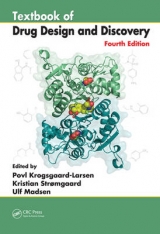
Textbook of Drug Design and Discovery, Third Edition
Taylor & Francis Ltd (Verlag)
978-0-415-28287-1 (ISBN)
- Titel erscheint in neuer Auflage
- Artikel merken
Building on the success of the previous editions, Textbook of Drug Design and Discovery has been thoroughly revised and updated to provide a complete source of information on all facets of drug design and discovery for students of chemistry, pharmacy, pharmacology, biochemistry, and medicine.
The book follows drug design from the initial lead identification through optimization and structure-activity relationship with reference to the final processes of clinical evaluation and registration. Chapters investigate the design of enzyme inhibitors and drugs for particular cellular targets such as ion channels and receptors, and also explore specific classes of drug such as peptidomimetics, antivirals and anticancer agents. The use of gene technology in pharmaceutical research, computer modeling techniques, and combinatorial approaches are also included.
DRUG DESIGN AND DISCOVERY: AN OVERVIEW
Lester A. Mitscher
Introduction
Historical Perspective
What Kinds of Compounds Become Drugs?
Preparation and Organization for Drug Seeking
Sources of Hits, Leads, and Candidate Drugs
Lead Optimization
Cell Biology and Genomics as a source of Drug Targets
Future Developments
ROLE OF MOLECULAR RECOGNITION IN DRUG DESIGN
Peter Andrews and Michael Dooley
Introduction
Thermodynamic Considerations of Drug Binding
The Physical Basis of Intermolecular interaction
The Total Energy of Intermolecular interaction
Estimating Individual Group Components in Ligand-Receptor Interactions and Co-
Operativity
Some Rules of Thumb
STEREOCHEMISTRY IN DRUG DESIGN
Ian J. Kennedy and David E. Jane
Introduction
What Are Stereoisomers?
The Origin of Stereospecificity in Molecular Recognition
Why is Stereochemistry Important in Drug Design?
Methods of Obtaining Pure Stereoisomers
Analytical Methods of Determining Purity of Stereoisomers
COMPUTER-AIDED DEVELOPMENT OF THREE-DIMENSIONAL PHARMACOPHORE MODELS
Tommy Liljefors and Ingrid Petterson
Structure-and Pharmacophore-Based Ligand Design
The Pharmacophore Concept
Basic Principles and a Step-By-Step Procedure
Pharmacophore Elements and Their Representations
The Receptor-Bound or 'Active' Conformation
Molecular Superimposition
Receptor-Excluded and Receptor-Essential Volumes
Solvation Effects
Examples of 3D-Pharmacophore Models and Their Use
QUANTITATIVE STRUCTURE-ACTIVITY RELATIONSHIPS AND EXPERIMENTAL DESIGN
Ulf Norinder and Thomas Hoberg
Introduction
Hansch Analysis
Physico-Chemical Properties
Applications of Hansch Equations
Pattern Recognition
3D-QSAR Methodologies
Experimental Design
RECEPTORS: STRUCTURE, FUNCTION AND PHARMACOLOGY
Hans Brauner-Osborne
Introduction
Receptor Structure and Function
Receptor Pharmacology
| Erscheint lt. Verlag | 1.8.2002 |
|---|---|
| Verlagsort | London |
| Sprache | englisch |
| Maße | 178 x 254 mm |
| Gewicht | 1837 g |
| Themenwelt | Medizin / Pharmazie ► Medizinische Fachgebiete ► Pharmakologie / Pharmakotherapie |
| Technik | |
| ISBN-10 | 0-415-28287-X / 041528287X |
| ISBN-13 | 978-0-415-28287-1 / 9780415282871 |
| Zustand | Neuware |
| Informationen gemäß Produktsicherheitsverordnung (GPSR) | |
| Haben Sie eine Frage zum Produkt? |
aus dem Bereich



